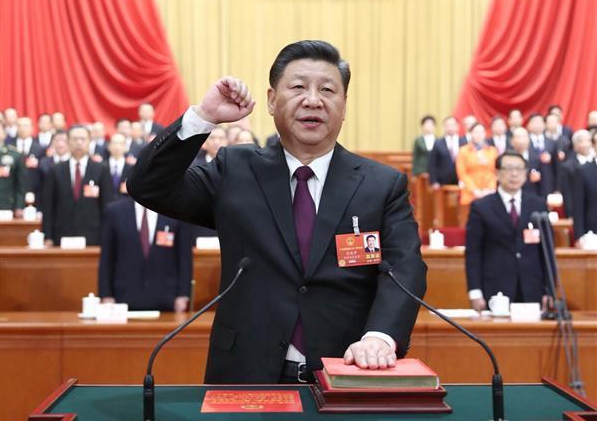Xi's second term in office
- By Sajjad Malik
 0 Comment(s)
0 Comment(s) Print
Print E-mail China.org.cn, March 19, 2018
E-mail China.org.cn, March 19, 2018

Xi Jinping takes a public oath of allegiance to the Constitution in the Great Hall of the People in Beijing, capital of China, March 17, 2018. Xi was elected Chinese president and chairman of the Central Military Commission of the People's Republic of China earlier Saturday at the ongoing first session of the 13th National People's Congress, the national legislature. [Photo/Xinhua]
The first session of the 13th National People's Congress has made key top appointments including electing Xi Jinping as the president by a unanimous vote. The 64-year old leader has also been elected as chairman of the powerful Central Military Commission, again by a unanimous yes vote.
Nearly 3,000 NPC deputies coming from the length and breadth of the country assembled for the important session that will be remembered for making important constitutional amendments, including lifting of the constitutional bar on number of years for the president.
Xi for the first time also took a formal oath and vowed allegiance to the constitution of the country by placing his left hand on the red-covered copy of the national charter and raising his right fist. The symbolic gesture will strengthen the institutions.
Xi has steadily risen to the top through hard work since he joined the central leadership as a member of the Standing Committee of the Political Bureau in 2007. He was elected as general secretary of the CPC Central Committee in 2012. The following year in March he was elected as president and chairman of the Central Military Commission.
As Xi begins his second term as president, he faces several challenges. The time is on his side and the president can think of making long-term strategic planning to achieve the goal of transforming the country into a true socialist polity.
But before reaching historic targets, he needs to meet the deadline of pulling the country out of chronic poverty by 2020 – a target set already. So far the indicators are on the right side of the equation and hopefully China will see the graduation of millions of people from penury to prosperity.
The president would have to take steps to accelerate the overall growth which has been slightly lower than the historic 7 percent. No panic so far as China continues to outperform several regional and global competitors, but there is space for improvement as Chinese benchmarks had been quite high in the previous decades.
Xi's project of eliminating sleaze is sure to be in the spotlight as he starts the second term. He showed courage after getting power in 2013 and launched a crackdown on corruption. But the battle is only half won so far.
The anti-corruption drive enforcer Wang Qishan has been rewarded for his efforts to cleanse the house of dirt. He has been appointed as Xi's deputy and expected to play a role in the struggle to make the society and government more transparent and open.
Xi's major foreign policy challenge in the second term is the issue of North Korea. The situation has been moving in the positive direction already. With the backchannel diplomacy gearing up for a face-to-face meeting between leaders of North Korea and the United States, there is a ray of hope to end tensions between the adversaries.
Relations between China and the U.S. will remain at the center of Xi's foreign policy choices in coming years. There is a discernable pattern in regards to the U.S.'s attitude towards China. Washington continues to sway between cooperation and confrontation with occasional measures to embarrass China.
Coinciding with the NPC electing Xi and other leaders for a second term, Donald Trump put signatures to a piece of legislation meant to encourage sending senior officials to Taiwan for meetings with high officials. Chinese foreign ministry spokesman voiced opposition to the bill as being against the spirit of a "one-China" policy.
The bill became law when Washington needed China more than any time for its efforts to end the confrontation with North Korea peacefully and subsequently achieve the objective of a nuclear-free Korean peninsula.
Xi's dream Belt and Road Initiative (BRI) will also be the focus of attention. The BRI unites the domestic and foreign policies in such a way that its success will promote growth and prosperity at home and win friends and allies abroad.
Despite criticism about the Chinese political system by opponents, Xi may not need to worry as long as he maintains a certain level of economic growth to improve the lives of poor people and ensures inexpensive education, health and justice to people in villages and towns.
His legacy should be a peaceful rise, which is considered a real challenge for any rising nation. So far, he has done really well to avoid the Thucydides trap.
Sajjad Malik is a columnist with China.org.cn. For more information please visit:
http://www.china.org.cn/opinion/SajjadMalik.htm
Opinion articles reflect the views of their authors, not necessarily those of China.org.cn.






Go to Forum >>0 Comment(s)